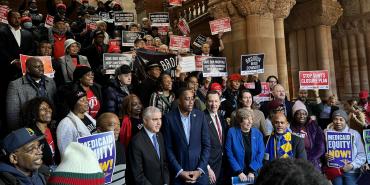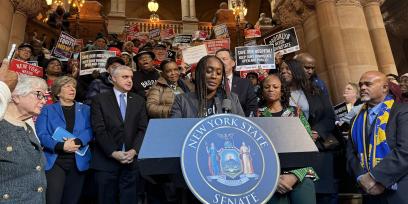Thanks to community activism and relentless advocacy by healthcare professionals, community activists, elected state officials and labor leaders, Downstate Health Sciences University Hospital in Brooklyn, N.Y., will remain open. After months of rallies, marches and public uproar over the SUNY chancellor’s proposed plan to close the hospital, the state's governor and Legislature listened and recognized the hospital's crucial role in Brooklyn's healthcare system.
“It is clear that Downstate is a vital resource to the community and must remain open,” says Fred Kowal, president of the United University Professions (UUP). His words resonate with the collective relief felt by the 400,000 patients and myriad communities the hospital serves each year.
“Thanks to the unrelenting advocacy of PEF members and the amazing support of Gov. Kathy Hochul and the Democratic majorities in both the New York State Senate and Assembly ... we continue to make meaningful gains to support state services and the state workers who provide those services,” says Wayne Spence, president of the New York State Public Employees Federation.
It’s not the first time the community and its advocates have had to fight to keep the hospital from closing. In fact, Redetha Abraham-Nichols, a registered nurse who came to Downstate in 2001 and is now president of the UUP chapter, has been in three such fights to save the hospital: “I always say we won the battle, not the war; this is one of our victories.”
The significance of this victory is underscored by the support allocated in the final New York state budget. Critical funding has been earmarked to sustain Downstate's operations, ensuring the continuation of its diverse range of essential services. In addition, a new nine-member community advisory board seeks to usher in a new era of collaborative decision-making. With representation from various stakeholders, including unions, this advisory board is tasked with navigating the hospital's financial challenges and charting a sustainable path forward.
The next step is to figure out how to affect the advisory board's work. "Knowing who is on that board is crucial because we intend to speak with and lobby each member assigned to this board over the next course of action,” says Abraham-Nichols. “We have a lot of experts here. We hope decisions are no longer made from 160 miles away, but in the community with educated professionals who know how a hospital should operate.”
The board represents a shift away from unilateral decision-making toward transparency and inclusivity, with the hope that the community's voice is heard in the hospital's future.
PEF and UUP remain committed to engaging stakeholders on the importance of this state-operated hospital. The Brooklyn Needs Downstate Coalition will continue its efforts to educate everyone about Downstate's dual roles—delivering essential healthcare in Brooklyn and educating the next generation of healthcare professionals.
Abraham-Nichols says having the support of the New York State United Teachers and the AFT was crucial in this fight and acknowledges the need for a coalition. “I think that created momentum and let people know we're together in this fight.” When they saw that PEF, NYSUT, AFT and UUP were working alongside each other, “I believe they thought twice about their decision-making.”
Abraham-Nichols says the community is the coalition's strongest ally. “We worked very well with the community in creating these alliances, and that will be the factor that moves us into the next generation of SUNY Downstate.”
[Adrienne Coles, UUP and PEF press releases]


